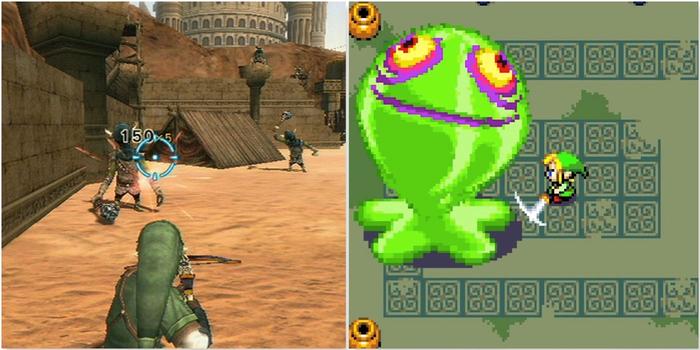The Legend of Zelda
has been popular ever since it debuted on the
Famicom
. 2021 marks this series’ 35th anniversary and it has a lot of celebrated titles under its belt. Fans want HD remasters of a lot of the main entries like
The Wind Waker
and
Ocarina of Time
.
RELATED:
Nintendo: Things Super Mario Does Better Than Zelda (& Things Zelda Does Better)
What about the lesser-known titles? There are some games out there that many fans haven’t been able to play since they were released. Some fans may not even know these games existed at all or maybe they just forgot about them. Some aren't that memorable, but others may need a revival in some way. The Philips CD-i games almost made the list, but those are more like games fans wish they could forget. Instead here's a look back at forgotten titles on the
SNES
,
DS
,
Wii
,
GameCube
,
Game Boy
, and more.
10
BS Zelda no Densetsu
The Japanese SNES
got an exclusive add-on called the Satellaview. With it came a plethora of digital games including two
Zelda
titles that were released episodically.
The first was
BS Zelda No Densetsu
in 1995 which was a remake of the first game. The other was
BS The Legend of Zelda: Ancient Stone Tablets
in 1997 which sort of continued the adventures of
A Link to the Past
.
9
Freshly-Picked Tingle's Rosy Rupeeland
Freshly-Picked Tingle's Rosy Rupeeland
was released in 2006
for the DS
. It was also released in Europe a year later. It’s an adventure puzzle game starring Tingle.
He actually got a lot of spinoffs with some coming to Europe but others staying in Japan.
Ripened Tingle's Balloon Trip of Love
was released as a Japanese exclusive in 2009 and played similarly to the other DS game.
8
Link's Crossbow Training
Link's Crossbow Training
was released in 2007
for the Wii
. It was a light-gun shooter that took place in the
Twilight Princess
world as that game released just a year prior.
RELATED:
The Legend Of Zelda: Twilight Princess Memes That Are Too Funny
During development, it was actually going to be more involved than just a light-gun shooter. Ideas were scrapped with the hopes that they would be reused for a now-canceled sequel.
7
The Legend of Zelda: Four Swords Adventures
The Legend of Zelda: Four Swords Adventures
released
for the GameCube
in 2004. It is one of few games on the GameCube that tried to maximize the potential of combining the console with the Game Boy Advance.
Up to four players could team up, using the GBA as a controller and map. It was an expensive game to set up but it was also a lot of fun.
6
The Legend of Zelda: Oracle of Seasons/Ages
The Legend of Zelda: Oracle of Seasons
and
Oracle of Ages
were 2001 Game Boy Color releases. They played like traditional top-down Zelda games with one favoring the power of time travel and the other favoring tampering with seasons as the gimmicks.
They were the first games Nintendo gave to Capcom to develop which was a gamble that paid off. Their plans were even more ambitious, with a now canceled third title in the works at one point.
5

The Legend of Zelda: The Minish Cap
The Legend of Zelda: The Minish Capwas another Capcom-made Zelda title and was released in 2005
for the GBA
. This game's gimmick was unique in that Link’s hat could shrink him down.
The concept alone makes
The Minish Cap
one of the more notable
Zelda
titles.
It stands as a great top-down entry in the series that has been seemingly forgotten for generations now.
4
The Legend of Zelda: Phantom Hourglass
The Legend of Zelda: Phantom Hourglass
was a spiritual sequel to
The Wind Waker
. It starred a version of Link in a flooded Hyrule, although it was not the same as in the GameCube game.
Released for the Nintendo DS,
Phantom Hourglass was a fresh take on the series at the time of its release.
Instead of a sailboat, Link and his Jack Sparrow-like friend, Captain Linebeck, use a steamboat complete with artillery and other interesting features.
3
The Legend of Zelda: Spirit Tracks
The Legend of Zelda: Spirit Tracks
was
a DS and Virtual Console game
which released a couple of years later in 2009. The game served as the successor to
Phantom Hourglass
and earned much praise from critics and fans alike.
It made use of a train as its main gimmick. That’s a first for the
Zelda
series. A lot of complaints about the previous title was that it took place in one dungeon which this game rectifies. While it got good reviews, it never really exploded in popularity among the fandom.
2
The Legend of Zelda: Tri Force Heroes
The Legend of Zelda: Tri Force Heroes
was a 2015 3DS release. It was sort of like a spiritual successor to
Four Swords Adventures
except it only supported three players.
RELATED:
Every Zelda Game On The 3DS, Ranked (According To Metacritic)
The unique twist was that the various Links could put on costumes. This gave them unique powers to solve certain puzzles faster. While cute, reviews thought it felt a little uninspired and the multiplayer was a bit hard to set up.
1
The Legend of Zelda: A Link Between Worlds
The Legend of Zelda: A Link Between Worlds
was a 2013 3DS sequel to
A Link to the Past
. This was a big deal at the time because many think that the SNES game is the best top-down entry in the series, if not the best overall.
Many mechanics would also inspire
Breath of the Wild
in some way. For example, instead of getting a tool in a dungeon to then using it to solve said dungeon, tools could be rented. It made the game less linear and thus more open.
NEXT:
Nintendo Games That Never Received A Single Sequel
Share
Share
Tweet
0
Comment
Next
Skyrim: Every Jarl & Their Stories
Related Topics
Lists
Legend of Zelda
The Legend of Zelda: A Link Between Worlds
About The Author
Tristan Jurkovich
(437 Articles Published)
Tristan Jurkovich began his career as a journalist in 2011. His childhood love of video games and writing fuel his passion for archiving this great medium’s history. He dabbles in every genre, but he’s particularly fond of RPGs and portable consoles. Aside from writing, Tristan also produces a plethora of videos on his YouTube Channel, ReActionExaminer. Check it out!
More From Tristan Jurkovich




